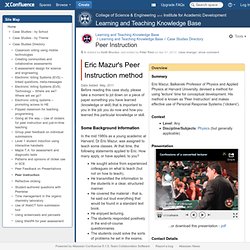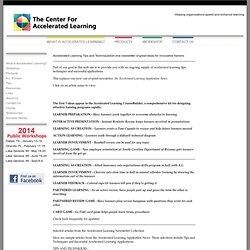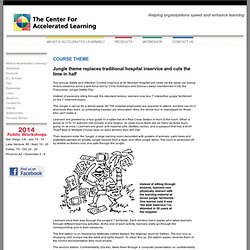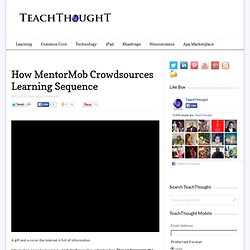

Class Time Reconsidered (Georgetown U.) by Derek Bruff on Prezi. Peer Instruction - Learning and Teaching Knowledge Base - Central Wiki Service. Date Added: May, 2011 Before reading this case study, please take a moment to jot down on a piece of paper something you have learned (knowledge or skill) that is important to you in the job you do now and how you learned this particular knowledge or skill.

Some Background Information In the mid 1980s as a young academic at Harvard, Dr Eric Mazur, was assigned to teach some classes. At that time, the following statements applied to Eric. How many apply, or have applied, to you? He sought advice from experienced colleagues on what to teach (but not on how to teach). The students liked Dr Mazur and said he was a good lecturer but he was nevertheless perplexed because the students also wrote in their end-of-course questionnaires things like "Physics is boring" and "Physics sucks.
" FCI Example The Truck Question: A heavy truck and a light car collide head on. during the collision, the force exerted by the heavy truck on the light car is What was done Motivations and aims What worked well. 50 Web 2.0 Learning Tools. 25 Ways To Use The iPad In The Classroom By Complexity. Accelerated Learning Tips and Techniques. Helping organizations speed and enhance learning What Is Accelerated Learning?

Workshop Products A.L. Europe Tips Resources Links About Us Contact Us Clients Testimonials Success Stories Dallas, TX - January 13-14 Orlando, FL - February 17-18 Lake Geneva, WI - May 19-20 Lake Geneva, WI - June 19-20 Lake Geneva, WI - Sept 8-9 Accelerated Learning Tips and Techniques On-line newsletter of great ideas for innovative trainers Part of our goal in this web site is to provide you with an ongoing supply of accelerated learning tips, techniques and successful applications.
This replaces our now out-of-print newsletter, the Accelerated Learning Application News. Click on an article name to view: The first 3 ideas appear in the Accelerated Learning CourseBuilder, a comprehensive kit for designing effective training programs rapidly. LEARNER PREPARATION - Have learners work together to overcome obstacles to learning ACTION LEARNING - Learners walk through a difficult technical diagram CARD GAME - Go Fish! The jungle. Jungle theme replaces traditional hospital inservice and cuts the time in half The annual Safety and Infection Control Inservice at St.

Michael Hospital will never be the same old boring lecture sessions since a task force led by Chris Hutchison and Donna Lawien transformed it into the 'Franciscan Jungle Safety Fair.' Instead of passively siting through the standard lecture, learners now tour 7 interactive jungle 'territories' on the 7 inservice topics. The Jungle is set up for a whole week. All 795 hospital employees are required to attend, but they can do it whenever they want, so scheduling hassles are eliminated.
Learners are greeted by a tour guide in a safari hat at a Red Cross Station in front of the room. Then learners enter the 'jungle' a large training room decorated with posters of animals, palm trees and waterfalls painted on sheets, jungle sounds from a tape, and other jungle items. Learners wind their way through the jungle's 7 territories. (The St. (July/August 1996 issue) How MentorMob Crowdsources Learning Sequence. A gift and a curse, the internet is full of information.

Information precedes learning, which itself precedes understanding. This underscores the role of sequence in learning—the right information at the right time. This is a niche MentorMob hopes to fill with its crowdsourcing approach to content curation and distribution. The early days of the internet were more than a little untamed, rewarding useable information to only the most careful or (open-minded) user. Misinformation was as easy to find as information, sending waves of scholastic audiences back to their encyclopedias. Wikipedia, with its crowd-sourced (and often loosely-edited) content has been a lightning rod for this transfer of power, drawing the ire of educators everywhere who insist that Wikipedia is the devil, and that credibility begins and ends with .edu domain extensions—perhaps in acknowledgement of the challenge to teach learners to evaluate information.
Image attribution flickr user charlief.